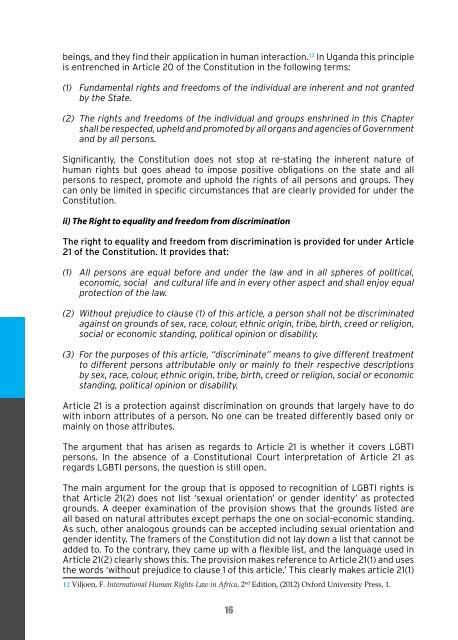PERSONS IN UGANDA
4Tks5WfQb
4Tks5WfQb
Create successful ePaper yourself
Turn your PDF publications into a flip-book with our unique Google optimized e-Paper software.
eings, and they find their application in human interaction. 12 In Uganda this principle<br />
is entrenched in Article 20 of the Constitution in the following terms:<br />
(1) Fundamental rights and freedoms of the individual are inherent and not granted<br />
by the State.<br />
(2) The rights and freedoms of the individual and groups enshrined in this Chapter<br />
shall be respected, upheld and promoted by all organs and agencies of Government<br />
and by all persons.<br />
Significantly, the Constitution does not stop at re-stating the inherent nature of<br />
human rights but goes ahead to impose positive obligations on the state and all<br />
persons to respect, promote and uphold the rights of all persons and groups. They<br />
can only be limited in specific circumstances that are clearly provided for under the<br />
Constitution.<br />
ii) The Right to equality and freedom from discrimination<br />
The right to equality and freedom from discrimination is provided for under Article<br />
21 of the Constitution. It provides that:<br />
(1) All persons are equal before and under the law and in all spheres of political,<br />
economic, social and cultural life and in every other aspect and shall enjoy equal<br />
protection of the law.<br />
(2) Without prejudice to clause (1) of this article, a person shall not be discriminated<br />
against on grounds of sex, race, colour, ethnic origin, tribe, birth, creed or religion,<br />
social or economic standing, political opinion or disability.<br />
(3) For the purposes of this article, “discriminate” means to give different treatment<br />
to different persons attributable only or mainly to their respective descriptions<br />
by sex, race, colour, ethnic origin, tribe, birth, creed or religion, social or economic<br />
standing, political opinion or disability.<br />
Article 21 is a protection against discrimination on grounds that largely have to do<br />
with inborn attributes of a person. No one can be treated differently based only or<br />
mainly on those attributes.<br />
The argument that has arisen as regards to Article 21 is whether it covers LGBTI<br />
persons. In the absence of a Constitutional Court interpretation of Article 21 as<br />
regards LGBTI persons, the question is still open.<br />
The main argument for the group that is opposed to recognition of LGBTI rights is<br />
that Article 21(2) does not list ‘sexual orientation’ or gender identity’ as protected<br />
grounds. A deeper examination of the provision shows that the grounds listed are<br />
all based on natural attributes except perhaps the one on social-economic standing.<br />
As such, other analogous grounds can be accepted including sexual orientation and<br />
gender identity. The framers of the Constitution did not lay down a list that cannot be<br />
added to. To the contrary, they came up with a flexible list, and the language used in<br />
Article 21(2) clearly shows this. The provision makes reference to Article 21(1) and uses<br />
the words ‘without prejudice to clause 1 of this article.’ This clearly makes article 21(1)<br />
12 Viljoen, F. International Human Rights Law in Africa, 2 nd Edition, (2012) Oxford University Press, 1.<br />
16


